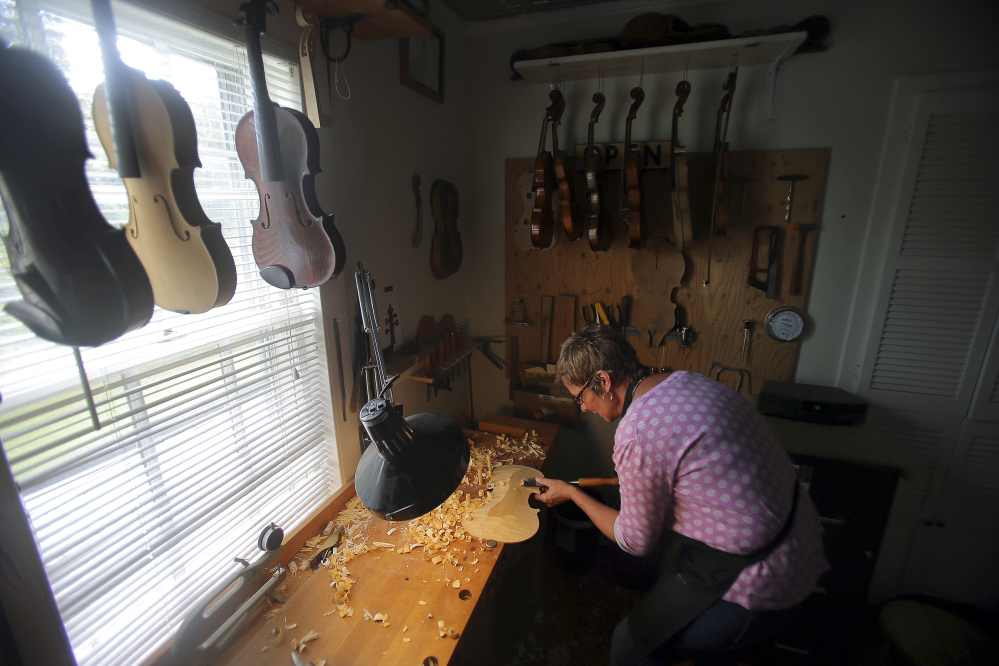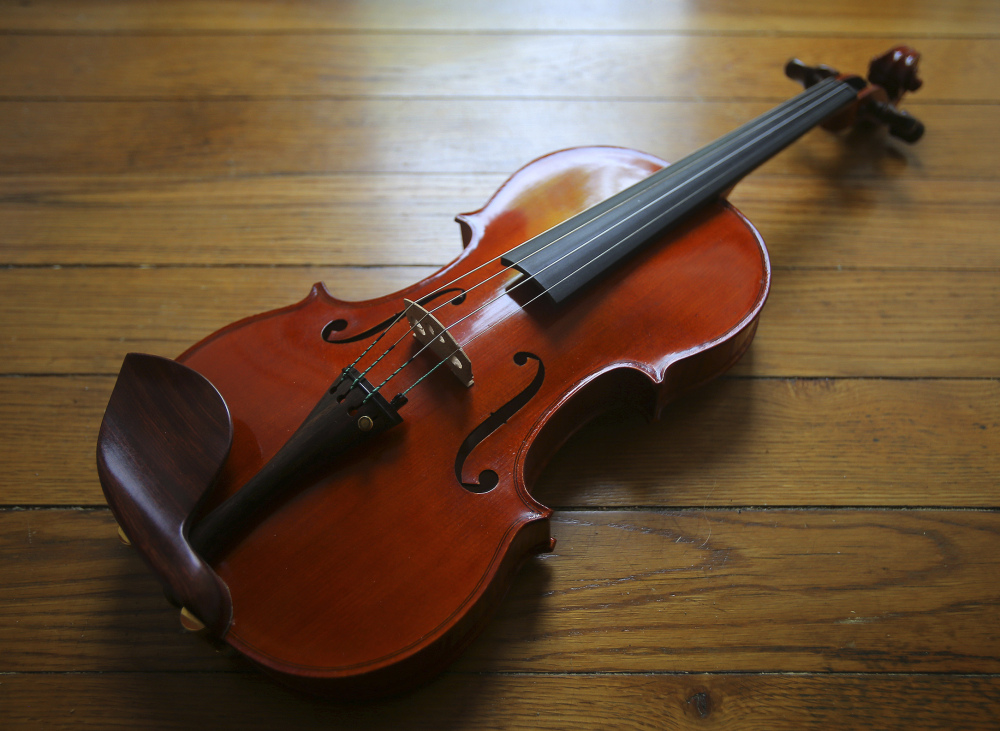CHATHAM, Mass. — Lots of people harbor dreams but never follow through on them. Rosemary Clancy’s was to craft violins by hand. She was 42 years old when she decided to drop everything and go for it.
It was a radical decision. Clancy had a major role in a successful family business in New York City. She had played violin all her life but had never worked in wood. She had never really used tools. Nothing prepared her for the exacting, three-year course of study she would undertake, except her lifelong love of traditional Irish music.
She took that career leap seven years ago. Today, the fruits are evident in the small red-brick building on Main Street in Chatham where Clancy runs an instrument rental business, teaches classes, does repairs – and makes violins.
There, she has created a small but vibrant traditional music scene. On a recent Tuesday evening, about three dozen people packed the compact sitting room, tapping their feet to a lively Cape Breton folk tune, and singing along with a traditional Irish waltz. Clancy played a violin she had made, accompanied by her 77-year-old father, Gene, and players in the crowd who stepped up to join in.
“It’s a new niche, something that wasn’t here before,” said Peter Maguire, a stone mason who made the trip from Boston to join the Clancys on flute for two numbers. “A lot of people wouldn’t be brave enough to take that gamble and throw away a successful career. It’s a labor of love.”
Clancy grew up surrounded by music and learned to play at 8. Her father and two uncles came to the United States from their native County Armagh in Northern Ireland to tour as the Irish Ramblers in the early 1960s. These Clancy brothers are unrelated to the Clancy Brothers band, and never made it as big.
But Gene Clancy’s lifelong dream was not to play in a band; it was to run his own business. He established a moving company in New York City, and his daughter, who goes by Rose, made her career there, specializing in moving and storing valuable collections like libraries and art. But the job had little to do with music, and Rose Clancy yearned for a deeper connection to her craft.
Seventeen years ago, she took a break and traveled to County Leitrim, Ireland, where she ended up at a music festival in the village of Drumshanbo. There, she met an American who was playing a violin he had made by hand.
“I became obsessed with it,” Clancy recalled. “That put the idea in my head. I started trying to find places where I could learn how to do this.”
She soon found the North Bennet Street School in Boston, which offers a three-year course on how to handcraft a violin. Each year, she would study the brochure and pick up an application, but she would never apply. She was too involved in the family business and she had a comfortable lifestyle, living in upstate New York, working primarily in Manhattan.
“I just didn’t think that it was really possible,” she said. “I didn’t have the courage.”
And she kept putting off her dream. Until she hit 42.
“I decided life’s too short; you have to go for it,” she said in her studio, a tiny room filled with finished violins, others in various states of repair, chisels, scraping and gouging tools, a cello she is working on, and the blocks of maple and spruce from which she carves the instruments.
When Clancy was accepted to the North Bennet Street School, her family was supportive but shocked.
“Right from the beginning I was a little worried about her,” said her father, who is an accomplished woodworker. “She couldn’t even sharpen a pencil.”
The course rectified that. The students started by learning how to sharpen and handle tools. It took weeks before Clancy mastered how to use a plane to make a completely flat piece of wood.
“I’d bring it up to the teacher and say, ‘This is flat,’ and the teacher would see that it wasn’t,” she said. “The first year I struggled a lot. There’s so much detailed work; you’re doing everything by hand.”
It was a matter of learning to see things the way they are, she said, and letting the tool work for her. She learned to make her own tools and manipulate metal scrapers and gouges of various sizes. Then the finer skills came: mastering the scroll, the c-bout, the f-hole. By the end, she learned to turn a rough block of wood into a smooth, arched, intricately carved violin.
Most violins are mass-produced using machinery, but a handcrafted violin can achieve a superior quality, said Roman Barnas, who teaches the violin course.
“Doing by hand allows us to be in very close contact with the material,” he said. “When we carve one after another, we also make it better than the last.”
“Rose took it to a higher level,” Barnas said. “She created a music scene around it.”
Clancy moved to Chatham, where her parents had a house, and founded the Chatham Fiddle Company in the brick building on Main Street three years ago. She hosts concerts there with highly regarded traditional music performers such as Andrea Beaton, a fiddler from Cape Breton Island, Nova Scotia, and Cillian Vallely of Armagh, Northern Ireland, who plays traditional Irish music on the uilleann pipes and low whistle.
Her informal Tuesday night gatherings pull in established fans and passersby. She has plans to put out a CD this summer.
The New York-based Irish Echo newspaper, in a 2013 article, praised the “lush, well-heeled sound befitting the appearance” of the violins she had made.
Learning to craft violins by hand was the catalyst for Clancy’s life change. Yet, though she has sold a few, that is not the focus of her new life. It’s all about the music.
“There’s a real joy to making an instrument,” she said, “then using it to play music.”
Copy the Story LinkSend questions/comments to the editors.




Success. Please wait for the page to reload. If the page does not reload within 5 seconds, please refresh the page.
Enter your email and password to access comments.
Hi, to comment on stories you must . This profile is in addition to your subscription and website login.
Already have a commenting profile? .
Invalid username/password.
Please check your email to confirm and complete your registration.
Only subscribers are eligible to post comments. Please subscribe or login first for digital access. Here’s why.
Use the form below to reset your password. When you've submitted your account email, we will send an email with a reset code.